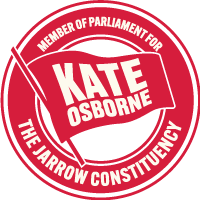
Kate’s latest column for Labour Outlook:
May Day alongside Workers Memorial Day on the 28th April is a time where collectively the Working Class can gather and reflect on generations of sacrifice and struggle. Whilst this time gives an opportunity to deepen into a nostalgic outlook, we also take time to reflect on battles that have been fought in the past.
My message to the people of Jarrow for May Day 2022, is that we use this occasion to celebrate our class, as we remember that Jarrow’s history is central to our identity, an identity where we can say to generations gone, we continue to carry the banners as we build for that better tomorrow.
When I reflect on the Industrial history of my constituency I think of Jarrow between the wars. A town, where employment relied on the interests of profit through the shipbuilding firm Palmers. A time where a National Government offset the problems of unemployment onto the backs of the Working Class by introducing the Means Test, and other draconian cuts to the Welfare State. Ninety years ago, in Jarrow at the peak of the Great Depression (1932), unemployment in the town stood at ‘80%’.
In her ground breaking work, ‘The Town that was Murdered’, Ellen Wilkinson described the subsequent poverty-stricken condition of Jarrow as, “not an accident, a temporary difficulty or a personal fault. But the permanent state in which the citizens of any capitalist country have to live”.
This May Day, rather than looking back at this seismic event in the footnotes of working-class history, it is only right to think about the relevance of the Jarrow Marchers fight today.
The Chancellor Rishi Sunak has said it would be, ‘silly to boost support on energy bills’. The lack of political action and economic help from this Government to help people in alleviating the serious Cost of Living Crisis, is a politically driven choice made by this Government.
Whilst today’s statistics don’t match up face value, with the stark figures of the 1930s, we have to remember that Jarrow of 2022 is faced with similar battles where key services are being stripped from our local authorities, where there is a growth in un-unionised insecure work and where there is a significant rise in the last 12 years in the opening of food banks.
Reflecting on what Jarrow faces today, and what the people in the constituency faced in the 1930s, it is vital to echo these words from Tony Benn, “Can you draw inspiration and courage from the people in the past who fought the battle it was their job to fight”.
Take courage and inspiration that it was the generation of the Jarrow Marchers, who took their shared experience of the ‘Hungry Thirties’, to make sure their lasting legacy after the Second World War was to say, never again.
Never again should the Working Class need to march for the lack of work, never again should the Working Class undergo the worry for lack of money, never again should the people suffer as a result of changing economic factors beyond their control.
It was these Working Class demands which became the bedrock of policy in Labour’s 1945 Government, which established the NHS, organised secure employment through the public ownership of industry and, with Ellen Wilkinson, as Secretary of State for Education, introduced compulsory secondary school education.
Even after defeat in the 2019 General Election, shared and collective experience is our most powerful tool, faced with the aftermath of the Pandemic, this May Day it is only right to think of the struggles faced by the people of Jarrow in the past, and what they managed to build from it.
With these lessons in mind, it is our duty through the Labour and Trade Union Movement to carry on the fight.

